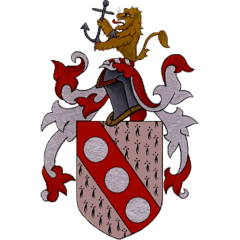The Fulcher surname is of early medieval English origin, and is derived from a Germanic personal name composed of the elements “folk” meaning people and “hari, heri” meaning army.
The Normans introduced the name into England after the Conquest of 1066.
Isolated examples of the name may have derived from the Old English pre 7th Century “Folchere”, or from the Old Norse “Folkar”, of uncertain origin. These names were far less common.
The personal name was first recorded as “Fulcher” in the Doomsday Book of 1086. The surname developed since 1167, and includes the following: Peter Fulker (1212, Wiltshire), Eustace Folchir (1212, Hampshire), Nicholas Fuker (1234, Devonshire) and Warin Fucher (1235, Essex).
The modern surname can be found as Fulcher, Fulger, Folger, Foulger, Fulker and Folker, and is mainly found in East Anglia.
Among the recordings in Norfolk are the christening of Richard, son of Matthew Fulcher, on February 18th 1566 at St. Peter’s Forncett, and the marriage of Edward Fulcher and Cicely Thorp on September 13th 1612 at All Saints, Norwich.
The first recorded spelling of the Fulcher name is shown to be that of Roger Fulchier, which was dated 1167 in the Pipe Rolls of Hampshire, during the reign of King Henry II, known as “The Builder of Churches”, 1154 – 1189.
Surnames became necessary when governments introduced personal taxation. In England this was known as Poll Tax. Throughout the centuries, surnames in every country have continued to “develop” often leading to astonishing variants of the original spelling.
